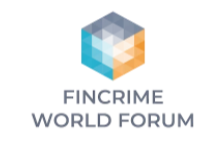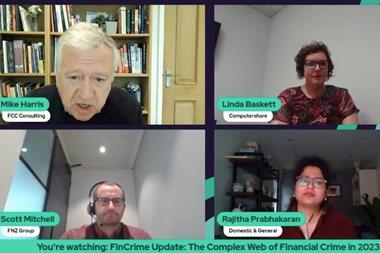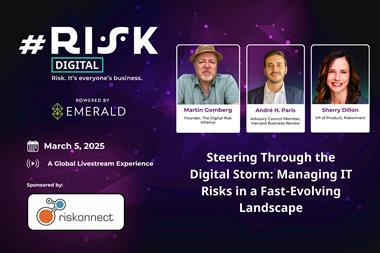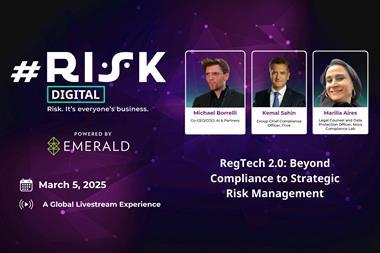Sanctions have become a central tool of foreign policy in jurisdictions around the world, prompting compliance professionals to pay closer attention to the geopolitical alliances and divisions that could result in new, and even conflicting, regulatory obligations.
Transcription
Leigh-Anne Moore:
Hello and welcome. On behalf of GRC World Forums, the organizers of this event, it gives me enormous pleasure to welcome you all to the afternoon sessions of FinCrime Global. My name is Leigh-Anne Moore, and I will be taking over from [Virginie 00:01:10] as your anchor for the second half of today’s event. Please make sure you view the agenda and you register for your sessions via the left hand side menu. You can also view our sponsors pages to learn more about them and view the resources we have available for you.
Leigh-Anne Moore:
Before we get started this afternoon, I want to let you know about some other events organized by GRC World Forums across the rest of this year. So in London, on the 7th and 8th of June and in Dublin on the 28th and 29th of June, FinCrime World Forum will feature as part of our Digital Trust Europe series. This is a series of in-person events, focusing on financial crime and other important topics, such as data protection, ESG and cloud modernization. At the ExCel Center in London on the 16th and 17th of November, we are running an exhibition called #RISK, which will feature a finance theater dedicated to bringing together top speakers in this space. For more information on these events, please make sure you check out the GRC World Forums website.
Leigh-Anne Moore:
So let’s get into our first session of the afternoon. This session is titled An Examination of the Geopolitical Landscape in 2022 and What This Means for Compliance Programmes. And I’m delighted to be hosting this session myself. I’d like to introduce you now to my fellow panelists. We have Andrew, Josh, and Nonso. Hi.
Chukwunonso Okoro:
Hello.
Josh Ray:
Hi, Anne.
Leigh-Anne Moore:
Hello, hi. Andrew, do you want to say a quick hello [crosstalk 00:03:12]?
Andrew Dalip:
Good morning from the Caribbean, ladies and gentlemen. Thanks again Leigh-Anne, always a pleasure to be here with you.
Andrew Dalip:
My name is Andrew Dalip I’m a attorney and [inaudible 00:03:31] consultant based in Trinidad and Tobago. Prior to that, I would’ve worked in the government sector, the Attorney General’s office. My goodness… [inaudible 00:03:42] sanction piece and …
Leigh-Anne Moore:
Thank you very much, Andrew. Josh?
Josh Ray:
Hi. Hi everyone. My name is Josh Ray. I am a litigator based in London, and my practice focuses on criminal defense in cross border cases and regulatory matters.
Leigh-Anne Moore:
Thank you very much. Thank you for joining us. And lastly, we have Nonso.
Chukwunonso Okoro:
Good morning everyone. My name is Nonso, I am an international investigator based in the UK. I’m also a post-graduate student of international security and terrorism at the University of Birmingham. And I’ve been in the domain of investigations for about 16 years, and I’ve worked with leading law enforcement agencies across the world, including the FBI, the U.S. Secret Service, the Department of Justice and so on and so forth. Thank you.
Leigh-Anne Moore:
Thank you so much. We’re joined by so many experts from across the field today, so it should be a very engaging session. And please do raise any questions as we are working through.
Leigh-Anne Moore:
Okay, let’s start with a little bit of background. So this is obviously a really emerging area at the moment. The landscape is changing all the time. Andrew, are you able to share some insights into what the current and emerging environment looks like as it relates to geopolitical developments and those which impact in particular, the sort of risk and the sanctions landscapes.
Andrew Dalip:
Surely Anne, thanks so much. I think I have really a lot to unpack here. So I’ll try to cover as much as I can in the short time that we have. So I’ll start by saying that if we’re using the next 12 months as a horizon, then it’s inevitable that the situation in Ukraine is going to hold a lot of our attention. Now, of course, that having been said, Russia cannot be looked at in isolation. Nor is that conflict, the only geopolitical issue that will shape the compliance landscape [inaudible 00:05:53].
Andrew Dalip:
Now, of course, from a compliance and perspective, we of course always consider risk in terms of customers, products and services, delivery channels, and geographical risk, and geography of course actually cuts across all of the other three because your customers have to come from somewhere and your products, services, and delivery channels is key to the needs of specific markets. So as we proceed, we will see that the geopolitical developments can impact on risk, both in terms of sanctions, compliance, and border EML compliance issue. Now, as we’ve discussed in other sessions, sanctions are, of course, quite simply a foreign policy tool, whether we are dealing with sanctions applied in multinational [inaudible 00:06:31] U.N. or autonomous sanctions, such as those applied by several countries like the U.S., U.K., and even Russia, and of course there is usually [inaudible 00:06:40] corruption to terrorism.
Andrew Dalip:
So in an increasingly polarized world, as we are currently facing in light of the crisis in Ukraine, we will continue to see an increasing divergence in these foreign policy positions among major powers, based on their respected economic and security influence. Now at the U.N. Level, we are therefore likely to see few assumptions over the next 12 months, as these are promulgated by the Security Council itself and subject to retool by any of the five permanent members, including both U.S. and Russia. Russia’s new circumstances, of course, as the most heavily sanctioned country rule will now factor into its position on such votes. So Russia may use its veto as leverage, as it seeks to established new trading and financial relationships in light of all the sanctions against it.
Andrew Dalip:
So we could actually possibly see a softening of Russia’s position on issues like Iran and North Korea, for example, both in terms of how it votes at the U.N. and in terms of Russia’s own implement sanctions. We know, of course, in Russia shares a land border with the DPRK, including road and rail linkages. So in the current environment, we could see an increased risk of trading in prohibited items, [inaudible 00:07:51] Russian authorities are turning a blind eye to the issue.
Andrew Dalip:
We of course also know that proliferating states are seizing the opportunities and key routes. So for example, in March of this year, the DPRK was continuing to test fire missiles, and Iran was continuing to enrich Uranium to the point where it is closer than ever to having its first nuclear bomb. So the point is, as opposed to distracting us from proliferation, [inaudible 00:08:18]. The Ukrainian conflict should actually cause us to pay close attention to what’s happening in those regimes.
Andrew Dalip:
Now another area I wanted to mention was technical bodies, and [inaudible 00:08:34] reality is that these geopolitical issues have a way polluting the work of the key technical bodies? So for example, we’ve sometimes seen some friction within U.N., [inaudible 00:08:39] DPRK, which can impact on how their reports are drafted. These experts of course come from major jurisdictions like Russia and the U.S. So increased polarization can potentially have an effect. And the part of expert reports are of course, very important sources of WMD sanctions evasion type policies, both for countries and obliged entities. So this could potentially impact on how we identify and mitigate these sanctions evasion risks, but another key technical body we really need to keep an eye on is the FATF. The FATF, of course, is the global standard setter for AML, and Russia currently sits around that. Now I haven’t personally sat in a FATF plannery meeting since before COVID, but I would say that you can always see geopolitical undercurrents in these things. And that’s likely [inaudible 00:09:26] now with the current situation. And this will impact on [inaudible 00:09:30] disparities, how they conduct mutual evaluations and which countries end up on the FATF gray and blacklist. And of course, if I was currently in the process of finalizing its methodology for the next round of mutual evaluations, which starts in about two years, so there’s probably no better time to make shifts in FATF’s priorities.
Andrew Dalip:
Now that having said the last part of January and February, FATF announced it was considering expelling Russia, but no final decision had been taken. In March, however, the council of Europe took a decision to exclude Russia, by extension Russia now ceases to be a member of MONEYVAL, which is one of the nine FATF original bodies. So there’s still a very distinct possibility of Russia being ejected from the FATF when the June plannery moves around. And if Russia is no longer member of the FATF or an FSRB, then it can find itself being listed by the FATF and subject to counter measures starting to enhance the [inaudible 00:10:23]. So this is important for those countries who have a foreign policy of nonintervention into the affairs of the countries, which usually means that they don’t implement sanctions whether they’re autonomous or universal sanctions like those imposed by the U.N. because the FATF’s leverage can result in the [inaudible 00:10:43] in Russia from having access to their financial system.
Leigh-Anne Moore:
Thank you so much, Andrew for that.
Andrew Dalip:
So what do you think about [inaudible 00:10:57] doesn’t mean that we’re… Sure.
Leigh-Anne Moore:
Thank you so much for your insights on that.
Andrew Dalip:
Hey, Leigh-Anne.
Leigh-Anne Moore:
I think that’s really… Can you hear me okay? Thank you so much for your insights. I think that’s really sort of set the scene for [crosstalk 00:11:07].
Andrew Dalip:
Yeah, no worries. I know there’s a lot of unpack here.
→ SEE ALSO: FinCrime World Forum
Part of the Digital Trust Europe Series - will take place through May, June & July 2022, visiting five major cities;
Brussels | Stockholm | London | Dublin | Amsterdam
Get to the edge of the financial crime debate at FinCrime World Forum.
Leigh-Anne Moore:
This afternoon. And we’re certainly going to come back to touch on some of the points that you’ve raised, particularly around the role of FATF and the U.N. A little bit later. I mean, you talked quite a bit about the increasing divergence and this must create such a challenge for compliance teams. Nonso, I wonder if you could maybe share with the audience, the ways in which this has maybe changed the compliance with requirements for firms, which are operating over multiple jurisdictions.
Chukwunonso Okoro:
Yeah. Thank you very much. So just to set a background or context, the current international liberal order, which is led by the United States is actually facing existential challenges. Remember that compliance cuts across jurisdictions still in this modern times, and we’re talking today about the geopolitical landscape in 2022. Just like Andrew had mentioned, you can’t talk about that without referring to the events in Russia. So now there are gaps that have been exploited by countries in trying to drive a different agenda. So the agenda that is currently being driven by the United States and her allies and across the international political order is being challenged, and especially in the areas of sanctions. For example, the developing nations feel that they are marginalized in terms of representation at the global level and in terms of global power politics, and that will be exploited by regional hegemons who have global ambitions, countries like China and Russia, countries like Iran, in terms of driving the agenda they have.
Chukwunonso Okoro:
So what that would do is that you’re going to see a lot of countries cherry picking what they comply to in terms of global sanctions requirements so sanctions requirements will no longer be unanimous like in the past. Countries are going to choose what they want to comply with based on where their national interest lies. And then we’re also going to see a decrease in cooperation with compliance investigations based on national interests. So countries will then choose what they want to cooperate with. When a global investigation into compliance with sanctions or compliance to global frameworks in terms of compliance, when that is being done, you’re going to see a decrease in cooperation from various regional blocks. And of course you are going to see that the sanctions on Russia will actually start impacting the general compliance of countries based on the impact on energy prices on their economies. So in the long term, we are going to see a lot of non-compliance even amongst the allies of Washington. Yeah. So I’ll stop here for now, and let others talk.
Leigh-Anne Moore:
No, thank you. Thank you so much. That’s interesting perspective. Josh, what are your thoughts on this?
Josh Ray:
I certainly agree with the points that Andrew and Nonso just raised. Just on the point about countries kind of refusing to comply with various sanctions or cherry picking the sanctions that they want to comply with, I think that’s part probably true. But at least in my line of work representing companies, companies don’t have that luxury, particularly when they’re either based in countries where sanctions have been applied, or they’re dealing with counterparties in countries where sanctions have been implied, or if they’re using U.S. dollars for various transactions. They kind of don’t have a choice as to whether to comply or not. So I think regardless of where companies and individuals are based, if they have international commercial ties, sanctions are going to continue to be a very important thing for them to comply with because either they themselves are going to be subject to sanctions and enforcement actions, or they’re going to be dealing with counterparties who are going to face sanctions of enforcement and are going to be potentially refuse to make good on contractual arrangements that are already in place.
Leigh-Anne Moore:
Thank you. Andrew, do you have anything additional to add there, on the point of sanctions?
Andrew Dalip:
No, I think Josh actually makes an excellent point. I think one thing we [inaudible 00:15:48] do is in terms of networks being developed amongst sanctions countries. So, I mean, Russia is now the most heavily sanctioned country world, but they’re the not first country to be sanctioned. And within the recent past, we’ve seen linkages being developed for example, between Iran and Venezuela. So Iran and Venezuela have been trading in terms of oil and other resources. And Russia has actually been trading with Venezuela prior to sanctions being imposed on Russia. So Russia now being in this position could serve as a nexus for development of a network amongst these sanctioned countries, which can create a parallel global system for want of a better way of putting it. So I think Josh is absolutely correct, but then again, you may have companies and organizations taking sides and getting themselves in a jurisdiction that is essentially outside of the reach of the current global AML system. So I think that’s something we have to pay attention to the future, as well.
Leigh-Anne Moore:
Definitely.
Chukwunonso Okoro:
Yeah. One other thing also, is even though Josh is right about the strict requirements of compliance to sanctions especially if you are operating in jurisdictions where Washington has a lot of influence, and if you’re using U.S. dollar. But we have to also remember that the Chinese Renminbi, the yuan, is one of the reserve currencies approved by the World Bank. So there are lot of countries then now who are shifting their foreign reserves and who are beginning to transact in the Renminbi as a reserve currency. So that is one of the ways of circumventing sanctions. If I transact in Renminbi, if I have my foreign reserves in Renminbi, I mean this is the long term, the impact of U.S. sanctions will actually be limited. It will be reduced from the dollar perspective.
Josh Ray:
Yeah, no. And if I could just respond to that, I totally agree with you. And I think we’ll see more and more of those type of efforts to circumvent U.S sanctions and using other currencies or even crypto currencies, we’re seeing a lot of. That will certainly continue because if this current war in Ukraine kind of establishes that sanctions are indeed going to be used as effectively a form of economic warfare in response to geopolitical events, certainly it’s not only going to be NATO countries that are going to be using sanctions going forward. It’s going to be every potential country in the world who wants to basically damage their adversaries without actually engaging in full-blown violence or full-blown war.
Leigh-Anne Moore:
Mm. I think you’ve raised some great points within this space and such a challenge for firms which have global operations. I mean, how do you see this impacting the sort of compliance requirements we’ve talked about, sort of non-compliance, and potentially there being an increase within that space, but what are the other areas of impact for compliance teams?
Josh Ray:
From our perspective, I think it’ll just make it more difficult for even well-meaning compliance departments to detect who they might be dealing with in terms of potential sanctioned parties. Because of these ways to try to get around sanctions, the typical kind of software that a lot of companies use to screen out sanctioned individuals or sanctioned locations, et cetera, I think are going to become less and less adequate. And I think those software programs are going to have to get a lot better. Companies going to have the need to do a lot more due diligence in terms of figuring out who might be behind their clients potentially many layers of ownership away and that sort of thing. So I think this will overall just lead to more complications and kind of more work effectively for compliance departments.
Leigh-Anne Moore:
And I think there’s been a question raised, and I think it’s an excellent question that even sort of, despite really high levels and thorough due diligence, there’s been a lot of acquisitions in 2021. And sort of trying to understand who falls under which sort of company umbrella is a real challenge in order to determine who is or isn’t on a sanctions list.
Josh Ray:
Yeah. And sorry, I’ll just give you my brief response to that. That’s true. And I think basically what that shows is that companies bake in regulatory risk when they’re undergoing M&A transactions. So as long as they’re doing everything, taking all reasonable steps to avoid breaching sanctions, they kind of are accepting the risk that, okay, well, potentially there might be some violation in this transaction, and maybe they’re going to have to pay a fine down the road. But even despite that, whatever the transaction is, it is still worth it for them to go through with. So at least that’s what I see in my practice.
Leigh-Anne Moore:
And any thoughts from the panel on how government agencies or regulatory watchdogs are really sort of honing their focus within this area?
Chukwunonso Okoro:
Yeah, just to build on Josh’s contribution. Now, Josh has talked about the inadequacy of compliance software. Now, what that would make companies do, there are two steps, and even the two steps may not be adequate. So the first step is that companies would need to have people on ground within those high risk domains, high risk countries. So if there are countries that are not adequately catered to, or covered by the compliance software, you will need to have people on ground, your people, your employees on ground in those countries. And secondly, those employees on ground they will need access to the local database, the local regulatory requirements, database, local information, local knowledge. But then the problem again, is most of the local information, most of locally available database and knowledge is housed within government establishments, regulatory agencies. Now, if a foreign company is operating within a local environment, and that local environment is sympathetic to countries that are under sanctions, how willing would they be to release such information to that company operating within that environment? So these are some of the questions that companies operating those environments will have to contend with.
Leigh-Anne Moore:
Andrew, anything to add?
Andrew Dalip:
Actually, so [crosstalk 00:22:49]. Thanks, Leigh-Anne. Yeah. Just circling back to that question in terms of what the regulators can do. I think is really important that regulators to ingest tunnel vision on the sanctions themselves. I mean, the environment in which sanctions are implemented, particularly the institution [inaudible 00:23:10] does have a knock on effect in terms of AML risk. So a country really has to look at it in terms of its own risk and context. So for example, we are seeing a situation in Russia where there is an increased demand in the domestic market for gold as the price of the Ruble just plummets. So that can create an increased demand, for example, in illegal gold trade. Now we know, for example, in Latin America, there’s been a thriving trade in illegal gold, which has been linked to other transnational organized crimes. And that gold has been finding its way to places like China, India, and UAE.
Andrew Dalip:
And we know that, for example, based on the voting at the UN that India has been maintaining a very close relationship with Russia, and their land border is shared with China, as well. So there is always that opportunity for illicit gold finding its way into the Russian market based on the current situation. And of course, there is a host of other ML particular offenses that this situation has created for us: human trafficking, human smuggling, a whole host of issues. But each country has to tie back their particular risk and [inaudible 00:24:18]. So we can’t just be focusing specifically on the sanctions themselves. The risk to the country from a compliance perspective is much broader than that.
Leigh-Anne Moore:
Yeah. And we’ve certainly spoken about how sanctions can impact climate control, for example.
Andrew Dalip:
Yeah, certainly. I mean, if we are talking about this being an accelerant for the illegal gold trade, we’ve had us situation in Latin America where drug traffickers have been pivoting towards illegal gold mining, because in some cases that’s more profitable. And that’s an extractive industry, which is going into cause a lot of environmental damage. So yeah, there is a [inaudible 00:25:08].
Leigh-Anne Moore:
I think we’ve lost Andrew. We’ll let him rejoin, but just whilst he’s doing that, we have had a question come in with respect to sort of ESG goals and increased scrutiny by regulatory agencies. So probably is a good time to address this question. So the question is, what do you think will be the impasse that might lead to the insurance industry sort of flexing their muscles, whether through requirements or considerable coverage rates? Josh do you want to answer? Do you have any thoughts on that question?
Josh Ray:
Nonso, go ahead.
Chukwunonso Okoro:
Let Josh go first. Josh, you can go first.
Josh Ray:
Okay. Good question. I think in my view, the answer is not until there is a perceived real regulatory risk for ESG violations. And at least in the United States and in the U.K., there’s been a lot of noise surrounding all of these new ESG requirements, but as of yet, there haven’t been real enforcement of those requirements, and that’s to be expected because the requirements are so new. And generally the SEC and other regulators give companies a bit of time to kind of sort out how they’re going to comply with these things. That being said in other countries, for example, Germany, I know has had some ESG enforcement actions, and I’m sure there are various others. But at least in so far as the U.S. and the U.K. are concerned, I think insurers aren’t going to fully be attuned to this issue until basically someone gets burned for violating them, [inaudible 00:27:06].
Leigh-Anne Moore:
That’s great. Thank you. Thank you, Josh. Nonso, anything additional to add?
Chukwunonso Okoro:
No, no, nothing, Anne. He has spoken well.
Leigh-Anne Moore:
Okay, brilliant. So let’s take a few more questions whilst we’re waiting for Andrew to join. So, one of the questions that’s come up before actually in these discussions, are we looking at a sort of downward spiral at the moment with the ongoing trends?
Chukwunonso Okoro:
Yeah, I can respond. So just like we mentioned at the beginning of the discussion. The current international liberal order or the [inaudible 00:27:53] order, it appears it’s going to an existential trend, like we mentioned. And there are challenges all around. You have regional hegemons who have global ambitions. You have China on the one hand, you have Russia on the other hand. You have Iran. You have North Korea. And then what we have is a kind of realignments going on all the time in a quest to exact supremacy over one part of the world or the other. And a lot of tools are being used. I mean, we have mentioned some of them, which is the sanctions method, as well as some other tools.
Chukwunonso Okoro:
For example, there is now a quest by China to provide alternatives to the global financial system. So China has established. Some of the banks established by China to try to counter the impact of the Western financial system. For example, the Asian Infrastructure Investment Bank, which China established in 2015. And there’s also the New Development Bank that China established in conjunction with Brazil, India, Russia, and San South Africa. And what these banks are trying to do is to provide an alternative to the current international financial system, which is dominated by the World Bank, the IMF, and the big western banks.
Chukwunonso Okoro:
Now, if this takes hold, if this gets established, if this is able to take off really well, we are going to have a lot of more alternatives to those who want to say circumvent sanctions, and we’re going to have a lot more options in terms of… So it will create additional problems for compliance professionals in terms of monitoring two global financial systems, so compliance professionals have to monitor the western-led financial systems dominated by the World Bank, the IMF and the big banks of the west, and then they also have to keep an eye on the Chinese-led financial system, dominated by the Asian Infrastructure and Investment Bank and the other bank that China has founded.
Chukwunonso Okoro:
So these are the trends I see. And actually, I will agree with the person that asks the question that it’s actually a downward trend, except there is a compromise which could be reached by the global hegemons. It appears that the trend will continue for the foreseeable future.
Leigh-Anne Moore:
Josh, any thoughts on that trend? Do you agree with Nonso?
Josh Ray:
I do agree with him. I mean, this is kind of outside of a legal question, but just in my personal opinion, I certainly think that we’re seeing a geopolitical realignment. And I certainly think that the role of the U.S. in terms of being the de facto reserve currency and kind of the de facto kind of manager of the global economy through Federal Reserve and through the World Bank and other institutions where the U.S. has a dominant voice, I think will probably change over time. And I think powers of other regional actors that Nonso described are going to become more and more important.
Josh Ray:
And I guess bringing it back to the topic of this conversation in terms of how do people comply with this stuff? Again, I think it’s just going to make life more complicated because if there are competing systems where companies have to comply with not only kind of the western sanctions, but also Chinese sanctions and sanctions from other countries. And if they have to kind of choose which one they’re going to comply with when those are in conflict, it’s just going to make things much more difficult. Obviously, there will be disruptions in kind of the global economy, if it’s kind of a tit for tat type situation where countries are kind of exchanging sanctions whenever another country does something that they don’t like. At the same time, I think in my view, the effectiveness of the sanctions that have been posed on Russia in terms of influencing its policies in Ukraine, and hopefully leading to a near term wind down of the war, I think is a good thing that we didn’t have to fall back on fighting Russia in an actual war.
Josh Ray:
And so if going forward, economic sanctions are the way that countries fight each other, rather than actual war. Well, then that seems probably almost a good thing because people may lose their jobs, and people are going to lose money, et cetera, but no one’s dying because of sanctions. So I don’t necessarily see it as a downward spiral, but I’m generally optimistic by nature. So maybe that’s [inaudible 00:32:51].
Leigh-Anne Moore:
Well, thank you. Thank you for that. And one of the concerns in this space for a lot of our audience are what are the sort of key strategies in remaining compliant with this sort of changing landscape? So how do firms make sure that they’re still controlling the sort of business risks from a practical perspective? Any thoughts on that?
Chukwunonso Okoro:
Josh, do you want to go first, or you want me to go first?
Josh Ray:
Sure. So my general advice to companies facing sanctions risks is really to just make sure that everything that they’re doing is well-documented and justifiable in the event that they’ll have to explain it to a regulator at some point. And so that’s just my overall broad advice is because these issues are so complex, because the scope of sanctions are not always clear, there are chances for inadvertent violations to happen. And in that event, I think it makes sense for companies to kind of prepare for a worst case scenario by making sure that they have a very solid paper trail of the decisions made by their board or by their compliance people, et cetera, in terms of how they’re choosing to address sanctions issues. So really, I mean that’s kind of my overall general advice that I give to my clients.
Leigh-Anne Moore:
That’s great advice. Thank you. So documenting and making sure that decisions are justifiable and you’ve got that transparency.
Josh Ray:
Exactly.
Leigh-Anne Moore:
Nonso, anything additional?
Chukwunonso Okoro:
Mm-hmm (affirmative). So just to build on what Josh has said. From a revenue perspective, from a profit-making perspective, so in addition to complying with the sanctions requirements or compliance requirements of the western-led-
Leigh-Anne Moore:
Sorry, my cat wants to join our panel today. Apologies.
Chukwunonso Okoro:
Yeah. So in addition to complying with the compliance framework within the western-led international political order, there will be need from a profit perspective, revenue generating perspective to also keep an eye on the compliance documents from China. So right now, China is the second biggest economy in the world. They have the second biggest economy in the world, and experts are predicting that by 2030, the Chinese economy will become the largest economy in the world. And that says a lot. That has a lot of implications. If any company is locked out of the Chinese market long term, it’s going to affect revenue, it’s going to affect their ability to make profits and to continue to operate.
Chukwunonso Okoro:
So just like I mentioned, in my previous response, there will be need to run two systems in the long term, except there is a compromise by the global powers. There will be a need in the long term to begin to operate two systems. So you comply to the western compliance frameworks, and then you also have to comply to the compliance frameworks led by China and her allies. Yeah. That’s what I see in the long term.
Leigh-Anne Moore:
So in the long term, you’re seeing a real sort of divergence.
Chukwunonso Okoro:
Yes.
Leigh-Anne Moore:
Josh, do you agree with that?
Josh Ray:
Yeah, I do. But again, I mean I’m not a policymaker, and the world is in turmoil at the moment, so who knows how this will all play out. But I think definitely sanctions are going to be part of the discussion for compliance and lawyers and everyone else involved in this world.
Leigh-Anne Moore:
And when we’re talking about sanctions, there’s been a number of comments raised around the sort of ethical implications on sanctions and possible sort of geo shifts focused on those economic risks. Anything that you can share with us in terms of your thoughts on that? It’s a difficult area, isn’t it?
Josh Ray:
Yeah. I can just say in my own experience, dealing with sanctions and dealing with companies who are operating in the developing world, I think what we’re seeing is like in Russia, when the people that you’re targeting have tons of assets and money held overseas in countries where it can be seized, sanctions can be very effective. But if you’re dealing with countries like Afghanistan, or you’re dealing with countries like Myanmar who have also been sanctioned, where the ruling parties that the sanctions are really meant to target, don’t have yachts in the Mediterranean and don’t have apartments in Manhattan to seize, I think there is an ethical dilemma in the sense that the sanctions can really just end up hurting the normal people who are living in those countries who had nothing to do with whatever the policy was that the sanctions are meant to address.
Josh Ray:
And then, obviously the Russian people, too, who, my understanding is, generally don’t support what’s going on in Ukraine. But they’re of course being hurt by the sanctions, as well. So, yeah, I think sanctions kind of raise those type of issues where their effect is very broad, even when they’re kind of target is very narrow.
Leigh-Anne Moore:
Hm. Thank you for that. And like I said, we’ve had a couple of questions raised around this area, so clearly very topical for our audience. So we’ve just got a few minutes left for our session this afternoon. I think we have Andrew back. I hope we do. What I-
Andrew Dalip:
Yes, I am [crosstalk 00:39:17].
Leigh-Anne Moore:
That’s okay. Welcome back, Andrew. So just in terms of, we’ve got a few minutes left. Let’s think about the sort of key takeaways. So what are some of the key takeaways from your perspective for our audience? Andrew?
Andrew Dalip:
Quite certainly the starting point is exactly what we’re doing here right now. We have to look down the line. Horizon scanning is a really important part of this exercise. And you have to take a broader approach that don’t just target focus on these sanctions themselves. Look at the broader knock on effect in terms of how it’s going to impact the money laundering landscape. And how it’s going cure vulnerabilities in particular. I think we started to touch on issues in terms of how it’s going to affect the demand for services, in countries like Russia, where, as Josh rightly said, sometimes targeted sanctions start to look more like comprehensive sanctions and affect the people who you do not want it to affect. So it’s going to create a different environment that can have an impact outside the country, as well. So keep looking down in line, take a risk averse approach to how you’re [inaudible 00:40:30] risk issue. And I think that’s going to put your company in a better position for the next 12 months.
Leigh-Anne Moore:
That’s really great. Thank you so much, Andrew. Nonso?
Chukwunonso Okoro:
Yeah, for me, the key take away from these discussions is the fact that companies have to start hedging their bets. If I may say, don’t put your eggs in one basket, if I may use that idiom. And the reason is this. The unipolar world, the unipolar global political system, in my opinion, it’s coming to an end. I think we’re about to enter the season of multi polarity, and it’s only a question of time. So I think companies need to start preparing for that ahead of time, in terms of putting the framework in place, in terms of things like recruitment, operational requirements because if you want to keep operating in various jurisdictions around the world, if you want to continue to be a multinational and a global company with presence in Asia, in America, you have to ensure that you comply with the requirements of those areas. And if those areas have regional or global hegemons who want to make their voices heard on the global stage. So companies have to start thinking in that direction, because I think in the next couple of years, we’re going to see that happen.
Leigh-Anne Moore:
That’s great. Thank you very much. Josh?
Josh Ray:
Yeah, no, I agree with what Andrew and Nonso said. The takeaway from my perspective is treat sanction seriously, particularly when you’re dealing with the U.S., there is a very real risk of enforcement action. And whenever in doubt, take the more conservative route in terms of complying and whether this kind of multipolar world that Nonso described actually comes to be, I think that it probably will. But for at least the near term, companies dealing with real kind of commercial realities surrounding these sections, just as I said before, make sure you’re documenting everything and make sure that you’re thinking about how you would explain your decision making if and when you need to do that to some sort of government agency and proceed accordingly.
Leigh-Anne Moore:
That’s great advice there. Thank you very much. And we’ve talked about this landscape sort of emerging. If we were having these discussions in sort of six months’ or 12 months’ time, would we be having similar discussions, or do you think we would see a real step change? I know Nonso, you’ve mentioned that you think you’ll see more divergence, but what else is we are we likely to see within this space in the next 12 months?
Chukwunonso Okoro:
So I think in the next 12 months, we are going to see some of the institutions we have today. I see someone has asked the question here about the WTO in the common section. So some of these institutions we are seeing today, like the World Bank, like the IMF, like the WTO with the trend that we’re observing now, actually like the challenge to the current political order by people like China and so on. We are going to see becoming less relevant. I had already mentioned that China has created an alternative global financial system, which is increasing in terms of membership, in terms of capability, in terms of reach. So I’m thinking that in the next 12 months, if we were to have these discussions again, we would see a change, not radically changed, but we are going to see a global political landscape especially from the financial perspective in terms of the global financial institutions and their presence and their capabilities.
Leigh-Anne Moore:
Thank you so much. And I think there’s a comment from one of our viewers that a sort of Chinese-led banking system may be a future game changer, as you’ve been saying. But it’s probably a sort of wait and see and not sort of longer term…
Chukwunonso Okoro:
Yeah, wait and see. Yeah.
Leigh-Anne Moore:
Perspective. Well, we’ve come to the end of our session now. I can’t believe how quickly the last 45 minutes have gone. And we’ve had some very great questions raised by the audience. So thank you so much for all of your engagement. It’s been a really interesting discussion and thank you so much to Josh and Nonso and Andrew for sharing your insights this afternoon. Thank you.
Chukwunonso Okoro:
Thank you.
Josh Ray:
Thank you.
Andrew Dalip:
Thank you.
Josh Ray:
Take care.
Chukwunonso Okoro:
Thank you, everyone. Take care.
Leigh-Anne Moore:
Thank you. Well, thank you very much, everyone. We’re going to take a short break now for 15 minutes, and then we will be back at 1:00 to look at U.S.-
FinCrime World Forum
Part of the Digital Trust Europe Series - will take place through May, June & July 2022, visiting five major cities;
Brussels | Stockholm | London | Dublin | Amsterdam
Get to the edge of the financial crime debate at FinCrime World Forum.
FinCrime World Forum is a two-day in-person event taking place as part of the Digital Trust Europe series. The event will feature presentations and panels from thought-leaders and anti-financial crime professionals that are leading the way on how we can better, more efficiently and more effectively fight financial crime.

An Examination of the Geopolitical Landscape in 2022 and What This Means for Compliance Programmes
- 1
 Currently reading
Currently readingAn Examination of the Geopolitical Landscape in 2022 and What This Means for Compliance Programmes
- 2
- 3































No comments yet